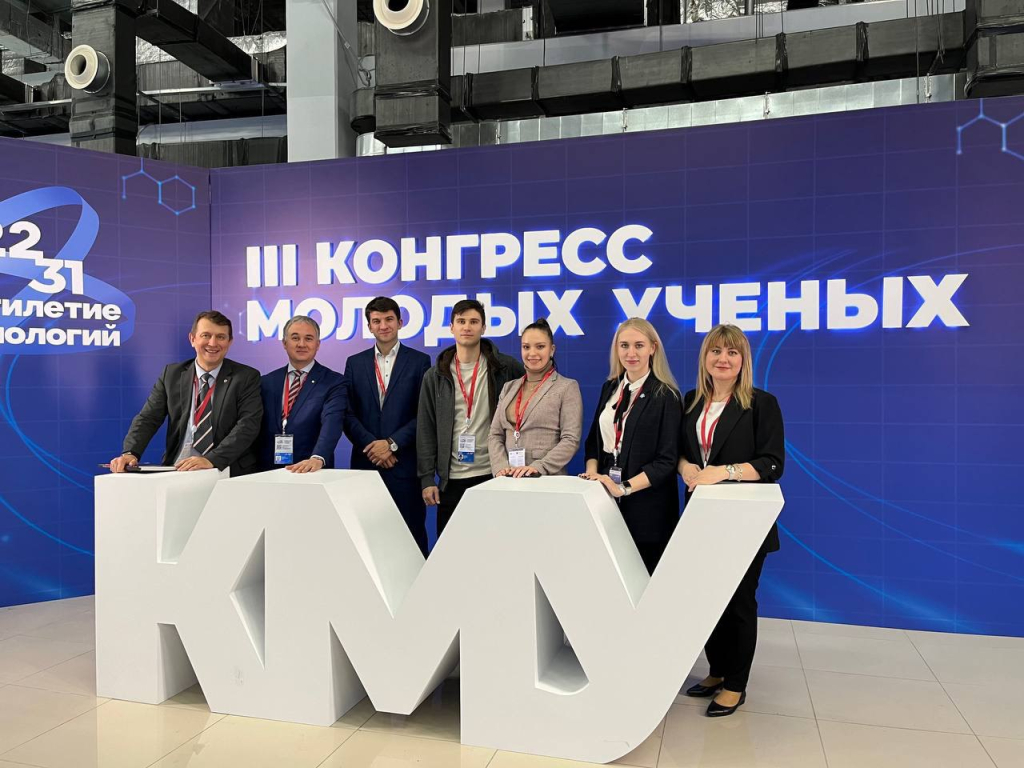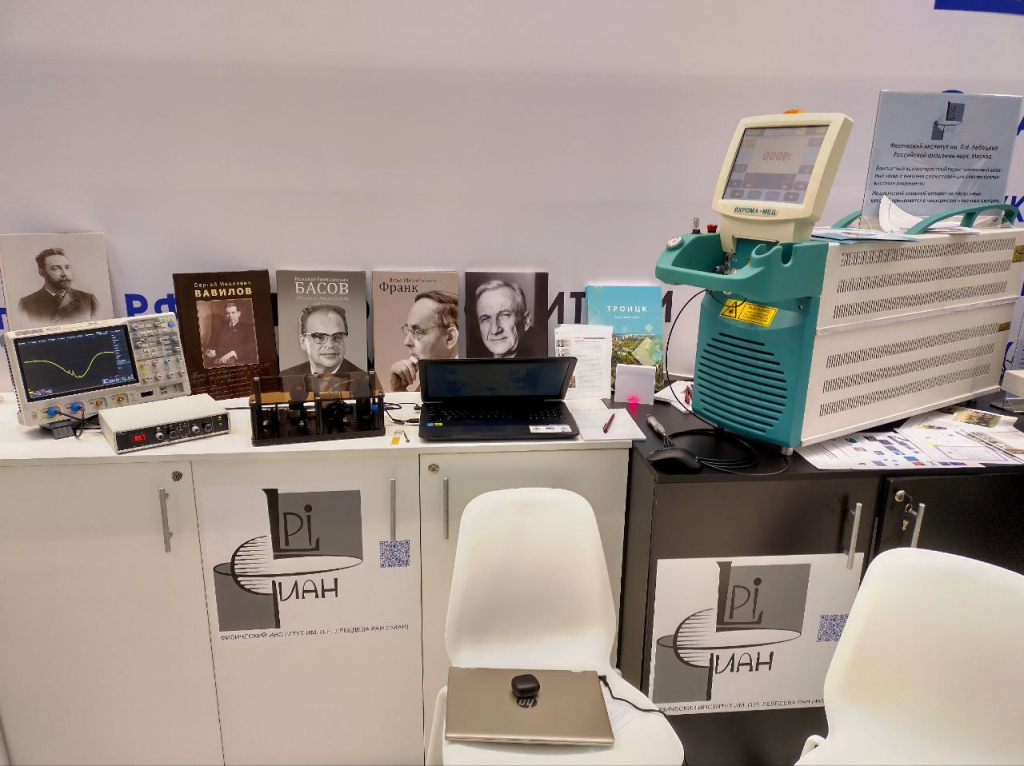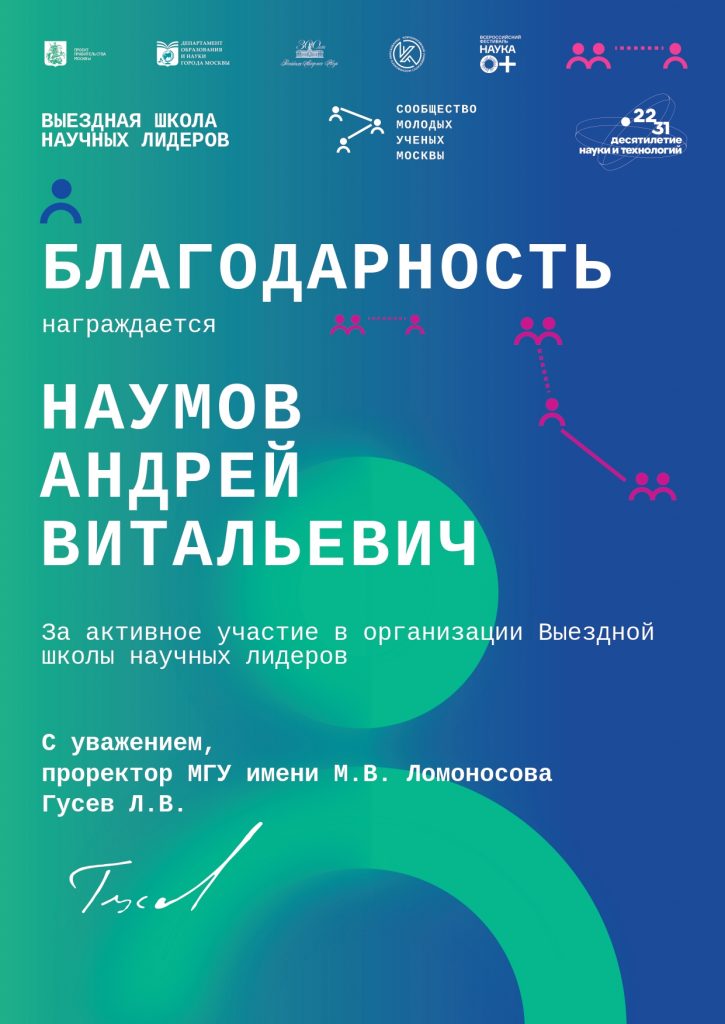Scientists of the LPI RAS, branch in Troitsk were part of the Third Young Scientists Congress, which was held on November 28-30, 2023 at the Sirius Park of Science and Art.
The delegation was led by the head of the LPI RAS, branch in Troitsk, Corresponding Member of the Russian Academy of Sciences Andrey Naumov, who was a speaker at several sessions of the Congress: “New approaches to the development of science cities of the Russian Federation and other territories with high scientific and technological potential”, “Scientific equipment: Russian solutions for comfortable and efficient work”, “Modern medical science for improving the quality of life in Russia”. During the discussions there were raised such topic as problems of equipping scientific laboratories with modern experimental equipment, taking into account the need to ensure Russia’s technological sovereignty. The discussion and preparation of proposals on the formation of new approaches to the development of science cities and other high-tech territories of the Russian Federation became quite popular. Special attention was paid to strategies for the development of scientific activities for young scientists.
For the second time, the exhibition “Nasha Laba” took place on the Congress – an initiative project implemented by the Coordination Council for Youth Affairs in the Science and Education Sectors of the Presidential Council for Science and Education, together with the Youth Council of the All-Russian Society of Inventors and Rationalizers, with the joint efforts of Russian manufacturers, scientific organizations and commercial companies, creating and constantly replenishing a people’s catalog of scientific equipment and consumables. Scientists of the LPI RAS, branch in Troitsk prepared an exhibition stand and presented achievements of laser technologies, photonics and sensors. The stand presentation was attended by:
• the scientific secretary of the LPI RAS, branch in Troitsk, Senior Researcher, Ph.D. in Physics and Mathematics – Kamil Karimullin
• the head of the Technopark “Precision Optical Technologies” Department of the LPI RAS, branch in Troitsk, Senior Researcher, Ph.D. in Physics and Mathematics – Anton Zalygin
• the head of the quantum emitters laboratory of the Department of advanced photonics and sensors of the LPI RAS, branch in Troitsk, Senior Researcher, Ph.D. in Physics and Mathematics – Maxim Eremchev

The main exhibition components was a compact, high-coherence, tunable diode laser with an external resonator for high-resolution spectroscopy (Laboratory of Frequency Standards, Laser Technology Department of the LPI RAS, branch in Troitsk). Such lasers are used in precision spectroscopy and quantum optics, including laser cooling of rubidium atoms. Ultracold atomic ensembles are a powerful tool for many modern experiments in the field of quantum technologies and fundamental research.
The medical laser device on copper vapor for micro-surgical operations in dermatology, cosmetology, gynecology, oncology and ophthalmology (Laboratory of Medical Laser Technology, Technopark “Precision Optical Technologies” Department of the LPI RAS, branch in Troitsk) had the attention of the participants. This device is an example of long-term experience in the development and production of high-tech laser equipment, as well as clinical experience in the use of laser technologies. And of corse it has a registration certificate from the Russian Federal Service for Surveillance on Consumer Rights Protection and Human Wellbeing. Now the developers’ team is undergoing certification procedures to ensure that the device meets the ongoing requirements for medical devices.

During the three days of the Congress, about 40 participants, including representatives of foreign delegations, visited the stand of the Lebedev Physical Institute. There were established connections with representatives of scientific and educational organizations, commercial and industrial companies from the Republic of Belarus, as well as from Moscow, Novosibirsk, St. Petersburg, Cheboksary, Kazan, Vladivostok, Ufa, and other cities of the Russia. The developments of the institute were presented to the Chairman of the Committee of the State Duma on Science and Higher Education Sergey Kabyshev and the Vice President of the Russian Chamber of Commerce and Industry Dmitry Kurochkin, with whom were discussed organizational issues regarding the possibilities of commercializing scientific and technical developments within the statutory activities of state budgetary science institutions.
Employees of the laboratory of frequency standards, such as the head of the laboratory – Sergey Zibrov, senior scientist – Maria Vaskovskaya, scientist – Dmitry Chuchelov, researcher – Kirill Sabakar, the head of the laboratory of medical laser technology at the Technopark Department of the LPI RAS, branch in Troitsk – Igor Ponomarev, and the head of the laboratory of new photon materials – Sergey Bedin, participated in the preparation of the stand and exhibition items.

The Head of the LPI RAS, branch in Troitsk Andrey Naumov and the researcher of the laboratory of new photon materials – Natalya Kovalets participated in the off-site School of Scientific Leaders organized with the Moscow Department of Education and Science. Within the framework of the school there were held scientific and educational workshops and lectures with the participation of leading scientists and science communicators, including RAS Academician Stepan Kalmykov, RAS Academician and Dean of Fundamental Physical and Chemical Engineering at Moscow State University – Yulia Gorbunova, Corresponding Member of the RAS Andrey Naumov, Corresponding Member of the RAS and Deputy Director for Scientific and Innovative Work at the Research Institute of Pulmonology of the Russian Federation – Kirill Zykov, Head of the Laboratory of New Materials for Solar Energy at Moscow State University M.V. Lomonosova – Ph.D. Alexey Tarasov, Head of the Department of Development of Scientific Activity at the Department of Education and Science of Moscow – Elena Pavlicheva, Head of the Analytical Department of Education and Science of Moscow – Arina Safuanovna, and many others. With active participation from representatives of the young scientist community in Moscow, topical problems in science and education were discussed, including “Support and Development of Moscow’s Scientific Potential,” “Scientists in Schools: Education in the Technological Change Era,” “Current Scientific Issues: The Role of the Russian Academy of Sciences,” “International Scientific Community,” “Methods of Interacting with Schoolchildren and Maintaining their Attention,” “Challenges of Humanity’s Future Habitat and Possible Scientific Solutions,” and many more.

Read more about site-off school of Science Leaders on the website of MIREA – Russian Technological University
Natalya Kovalets took part in a thematic session “Women in Science: Trends and Perspectives”. This topic was also attracted because of the tasks of the Decade of Science and Technology related to the development of the scientific potential, including specific measures to support female scientists.
Another interesting project implemented at the Congress was the “Nauchnaya Gostinaya”, which represents an innovative format for popularizing a science-centric view of the world and fostering dialogue among scientists and with scientists. In the thematic section “100 Questions to an Academician”, Andrew Naumov answered questions from the audience related to his biography, career as a scientist, teacher, science popularizer, and the relationship of scientists’ professional activities with the Russian Academy of Sciences.
Numerous cultural and sports events and master classes were organized for the participants of the Congress. In the evening of November 28, the game “What? Where? When?” took place with experts from the club and young scientists. Andrey Naumov played for the team of the Russian Academy of Sciences, and Anton Zalygin was part of the team of young scientists, which took 3rd place in the game.
Participation in events like the Young Scientists Congress provides an opportunity to stay informed about important and current issues facing Russian science in modern conditions. For young employees of the institute, whether they are involved in fundamental science or applied research, this is an introduction to accumulated experience and modern trends in the development of scientific knowledge, a valuable opportunity to understand their own position and demand within the scientific community.
